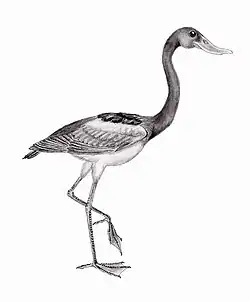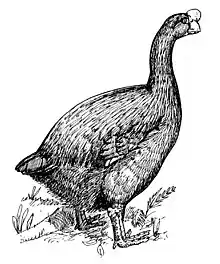Goldeneye (duck)
Bucephala is a genus of diving ducks found in the Northern Hemisphere.
| Goldeneye | |
|---|---|
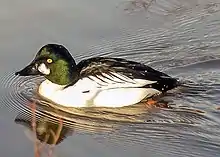 | |
| Common goldeneye (Bucephala clangula) | |
| Scientific classification | |
| Domain: | Eukaryota |
| Kingdom: | Animalia |
| Phylum: | Chordata |
| Clade: | Dinosauria |
| Class: | Aves |
| Order: | Anseriformes |
| Family: | Anatidae |
| Subfamily: | Merginae |
| Genus: | Bucephala S.F. Baird, 1858 |
| Type species | |
| Anas albeola (bufflehead) Linnaeus, 1758 | |
| Species | |
| Synonyms | |
|
Glaucionetta | |
Taxonomy
The genus Bucephala was introduced in 1858 by American naturalist Spencer Baird with the bufflehead as the type species.[1][2] The genus name is derived from Ancient Greek boukephalos, meaning "bullheaded", from bous "bull", and kephale, "head", a reference to the crest of the bufflehead making its head look large.[3]
The bufflehead was formerly treated as the only member of the genus (sometimes unnecessarily changed to Charitonetta) while the goldeneyes were incorrectly placed in Clangula (as Clangula americana), the genus of the long-tailed duck, which at that time was placed in Harelda.[4] It may yet be correct to recognise two genera, as the bufflehead and the two goldeneyes are well diverged. In this case, Bucephala would be restricted to B. albeola and the name Glaucionetta (Stejneger, 1885) resurrected for the goldeneyes.
Species
The three living species are:[5]
| Male | Female | Scientific name | Common name | Distribution |
|---|---|---|---|---|
.jpg.webp) | -_female.jpg.webp) | Bucephala clangula | Common goldeneye | Widespread in North America and Eurasia |
 | _(6881754634).jpg.webp) | Bucephala islandica | Barrow's goldeneye | North America and Iceland |
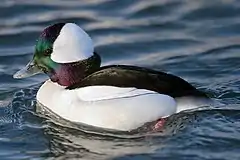 |  | Bucephala albeola | Bufflehead | North America south to Mexico |
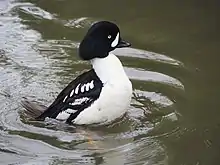
- Bucephala cereti (Sajóvölgyi Middle Miocene of Mátraszõlõs, Hungary - Late Pliocene of Chilhac, France)
- Bucephala ossivalis (Late Miocene/Early Pliocene of Bone Valley, United States), which was very similar to the common goldeneye and may even have been a paleosubspecies or direct ancestor
- Bucephala fossilis (Late Pliocene of California, United States)
- Bucephala angustipes (Early Pleistocene of central Europe)
- Bucephala sp. (Early Pleistocene of Dursunlu, Turkey: Louchart et al. 1998)
References
- Baird, Spencer F. (1858). Reports of explorations and surveys to ascertain the most practical and economical route for a railroad from the Mississippi River to the Pacific Ocean made under the direction of the secretary of war in 1853-1856. Vol. 9 Birds. Washington: Beverly Tucker, printer. pp. xxiii, L, 788, 795.
- Mayr, Ernst; Cottrell, G. William, eds. (1979). Check-List of Birds of the World. Vol. 1 (2nd ed.). Cambridge, Massachusetts: Museum of Comparative Zoology. p. 594.
- Jobling, James A (2010). The Helm Dictionary of Scientific Bird Names. London: Christopher Helm. p. 79. ISBN 978-1-4081-2501-4.
- Report of the National conference on utilization of forest products. New national museum, Washington, DC, November 19 and 20, 1924. Issue 13. US Govt. print. off. 1925.
- Gill, Frank; Donsker, David; Rasmussen, Pamela, eds. (January 2022). "Screamers, ducks, geese & swans". IOC World Bird List Version 12.1. International Ornithologists' Union. Retrieved 4 July 2022.
- Louchart, Antoine; Mourer-Chauviré, Cécile; Guleç, Erksin; Howell, Francis Clark & White, Tim D. (1998). L'avifaune de Dursunlu, Turquie, Pléistocène inférieur: climat, environnement et biogéographie. C. R. Acad. Sci. Paris IIA 327(5):341-346. [French with English abridged version] doi:10.1016/S1251-8050(98)80053-0 (HTML abstract)
External links
- Common Goldeneye at Birdzilla

